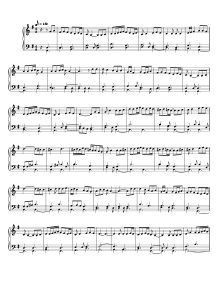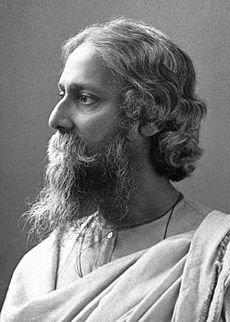Amar Sonar Bangla facts for kids
| English: My Golden Bengal | |
|---|---|
| Amar Sonar Bangla | |
 |
|
| National anthem of | |
| Lyrics | Rabindranath Tagore, 1905 |
| Music | Gagan Harkara, 1889 (arranged by Samar Das, in 1972) |
| Adopted | 10 April 1971 (provisional) 26 March 1972 (official) |
"Amar Sonar Bangla" means "My Golden Bengal." It is the national anthem of Bangladesh. This song is like a poem praising Mother Bengal. Rabindranath Tagore, a famous writer from Bengal, wrote the words in 1905. The tune came from a song by a singer named Gagan Harkara. Later, Samar Das arranged the music for the anthem we hear today.
Contents
What "Sonar Bangla" Means
The word sonar means "made of gold." It comes from sona, which means gold. The word amar means "my." So, "Sonar Bangla" can mean "Golden Bengal." In the song, it shows how much people love and value Bengal. It means "beloved" or "precious" Bengal.
History of the Song

This song was written in 1905. At that time, the British Empire ruled India. They decided to split the large province of Bengal Presidency into two parts. This decision was announced on July 20 and took effect on October 16.
Many people believed this split was done to divide people. One part, East Bengal and Assam, had more Muslims. The other, West Bengal, had more Hindus. Songs like "Amar Sonar Bangla" were written to bring people together. They wanted to remind everyone of their shared Bengali spirit. The words first appeared in magazines called Bongodorshon and Baul in September 1905. The song's music notes were written down by Indira Devi Chaudhurani, Tagore's niece. She heard Tagore sing the song and wrote down the notes.
Becoming the National Anthem
The first ten lines of "Amar Sonar Bangla" became Bangladesh's national anthem. This happened in 1971 during its liberation war. Only these first ten lines are sung as the anthem. The music for the anthem was arranged by Samar Das.
Lyrics of the National Anthem
The following table shows the lyrics of the national anthem. The words are slightly different from the original poem.
| Bengali | Romanisation of Bengali | IPA transcription | English translation |
|---|---|---|---|
|
আমার সোনার বাংলা, আমি তোমায় ভালোবাসি। |
Amar shonar Bangla, ami tomay bhalobashi. |
[a.mar ʃo.nar baŋ.la ǀ a.mi to.maj bʱa.lo.ba.ʃi] |
My golden Bengal, I love you. |
World Record for Singing
On March 26, 2014, Bangladesh tried to set a world record. They wanted the most people to sing a national anthem at the same time. This event was held at Dhaka's National Parade Ground. About 254,537 people sang the anthem together. The Prime Minister of Bangladesh and other important leaders were there. The Guinness Book of World Records confirmed this new record on April 9, 2014. However, India later broke this record on January 21, 2017.
See Also
 In Spanish: Himno nacional de Bangladés para niños
In Spanish: Himno nacional de Bangladés para niños
- Notuner Gaan, the national march of Bangladesh, written by Kazi Nazrul Islam.
- Ekusher Gaan, a song in the memory of the martyrs of the Bengali language movement
- Jana Gana Mana, national anthem of India, also written by Rabindranath Tagore
- Banga Mata
- Joy Bangla
 | May Edward Chinn |
 | Rebecca Cole |
 | Alexa Canady |
 | Dorothy Lavinia Brown |

